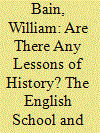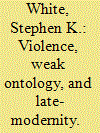| Srl | Item |
| 1 |
ID:
078484


|
|
|
|
|
| Publication |
2007.
|
| Summary/Abstract |
This article explores what English School theorists claim for history in the study of international relations. The writings of Hedley Bull and Herbert Butterfield are examined with a view to providing an idealized though coherent distillation of the place historical enquiry enjoys in English School theory. The limitations of their respective positions, which cannot fully sustain the English School claim that historical knowledge is important in understanding international relations, are addressed by turning to Michael Oakeshott's conception of history as fable. The article concludes by reaffirming the place English School theorists give to historically informed theory by, paradoxically, denying to history any didactic character and therefore any practical relevance. For it will become evident that a didactic history - and whatever lessons it offers - is an illusion made in the present for the present, which is neither historical nor instructive
|
|
|
|
|
|
|
|
|
|
|
|
|
|
|
|
| 2 |
ID:
092142


|
|
|
|
|
| Publication |
2009.
|
| Summary/Abstract |
This essay responds to the characterization Ted Miller offers (in his December 2008 essay in Political Theory) of the kind of nonfoundationalism I have referred to as "weak ontology," and that Gianni Vattimo frequently calls "weak thought." Miller argues that such a position embodies, first, a philosophy of history in which strong ontologies (e.g., religion) are assessed categorically as passé, and, second, are associated essentially with violence. I show that while these characterizations may be appropriate for Vattimo's thought, they are not for weak ontology as I understand it. Finally, I suggest that the former might more usefully be categorized as "antifoundationalism" and the latter as "nonfoundationalism."
|
|
|
|
|
|
|
|
|
|
|
|
|
|
|
|